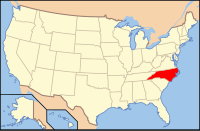Columbus County, NC
| Columbus County, North Carolina | |
|---|---|

Columbus County Courthouse, Whiteville
|
|
 Location in the U.S. state of North Carolina |
|
 North Carolina's location in the U.S. |
|
| Founded | 1808 |
| Named for | Christopher Columbus |
| Seat | Whiteville |
| Largest city | Whiteville |
| Area | |
| • Total | 954 sq mi (2,471 km2) |
| • Land | 937 sq mi (2,427 km2) |
| • Water | 16 sq mi (41 km2), 1.7% |
| Population | |
| • (2010) | 58,098 |
| • Density | 161/sq mi (62/km²) |
| Congressional district | 7th |
| Time zone | Eastern: UTC-5/-4 |
| Website | www |
Columbus County is a county located in the U.S. state of North Carolina. As of the 2010 census, the population was 58,098. Its county seat is Whiteville.
According to the U.S. Census Bureau, the county has a total area of 954 square miles (2,470 km2), of which 937 square miles (2,430 km2) is land and 16 square miles (41 km2) (1.7%) is water. It is the third-largest county in North Carolina by land area. There are several large lakes within the county, including Lake Tabor and Lake Waccamaw.
One of the most significant geographic features is the Green Swamp, a 15,907-acre area along highway 211 in the north-eastern portion of the county. It contains several unique and endangered species, such as the venus flytrap. The area contains the Brown Marsh Swamp, and has a remnant of the giant longleaf pine forest that once stretched across the Southeast from Virginia to Texas.
The county was formed in 1808 in the early federal period from parts of Bladen and Brunswick counties. It was named for Christopher Columbus.
In 1983, State and Federal Investigators began Operation Gateway US, an investigation into the activities of several elected officials in Brunswick and Columbus counties. Law enforcement seized 37 million dollars of illegal drugs, and arrested several leading citizens in the area. The scandal was labeled "COLCOR" in the press, shorthand for Columbus Corruption.
The Waccamaw Siouan Indians are one of eight state-recognized tribes. Their homeland territory is at the edge of Green Swamp in present-day Columbus County. Historically, the "eastern Siouans" had territories extending through the area of Columbus County prior to any European exploration or settlement in the 16th century.
...
Wikipedia
